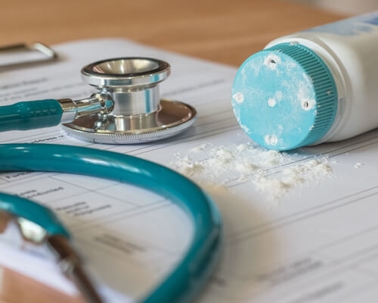Reuters News: "Johnson & Johnson Knew for Decades That Asbestos Lurked in its Baby Powder"
Back in 1997, our client Darlene Coker was diagnosed with mesothelioma at the age of 52. With the assistance of co-counsel, Herschel Hobson, Roger Worthington and our firm investigated Darlene’s past for exposure to asbestos-containing products, the majority of which were used in industrial, commercial, and military settings. An operator of a massage school, Darlene had no exposure to these types of products. Darlene did, however, regularly use Johnson’s Baby Powder throughout her life.
Having handled cases on behalf of hundreds of workers exposed to asbestos from industrial talc used in the making of tires, it was suspected that asbestos in Baby Powder was responsible for Darlene’s cancer. Research revealed that talc used for cosmetic talc products like Johnson’s Baby Powder, was sourced from the same mines as talc used for industrial talc. Also, reports from the testing of cosmetic talc, in general, revealed that many cosmetic talc products contained asbestos.
A lawsuit was filed against J&J later that year. It was the first known case in which it was claimed that asbestos in J&J Baby Powder caused a plaintiff’s mesothelioma.
J&J denied responsibility, asserting that its Baby Powder was asbestos-free. J&J avoided producing the results of internal talc testing and other company records requested in the case. After nearly two years of litigation, and being stonewalled from evidence of asbestos found in Baby Powder, Darlene’s case against J&J was dismissed.
Nearly 20 years later, Reuters News published an investigative report on December 14, 2018 concluding that:“Johnson & Johnson knew for decades that asbestos lurked in its Baby Powder ”
Reuters based its report on a review of documents which J&J was compelled to produce in recent cases, as well as deposition and trial testimony in these cases. It said the review showed that from 1971 to the early 2000s, J&J executives, mine managers, doctors and lawyers were aware the company's raw talc and finished powders tested positive for asbestos. Those involved discussed the problem, but they did not disclose it to regulators or the public, Reuters' examination found.
We applaud Reuters reporter Lisa Girion for her comprehensive presentation of the evidence which has finally come to light on this matter. The evidence is the result of a 20+ year effort on the part of asbestos cancer victims’ attorneys, beginning with the Darlene Coker case, and including many recent cases involving our clients.
This evidence is of grave importance to the public and will be key to obtaining some measure of justice for those, like Darlene Coker, who never could have imagined that using J&J Baby Powder could place them at risk for developing deadly mesothelioma cancer.
Asbestos litigation has a long and sordid history of asbestos product manufacturers trying to cover up their misdeeds. It appears that J&J is but the latest example. We are confident that, like the others, J&J will ultimately be held to account to customers, cancer patients, regulators, and shareholders for its atrocious behavior.


